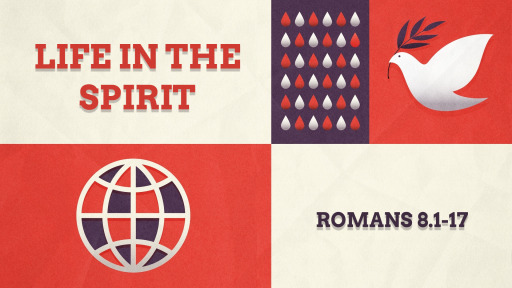Romans 8:1-17a

Are you living in the Spirit?
Intro
On January 6, 1941, President Franklin Delano Roosevelt addressed Congress on the state of the war in Europe. Much of what he said that day has been forgotten. But at the close of his address, he said that he looked forward “to a world founded upon four essential human freedoms.” He named them: freedom of speech, freedom of worship, freedom from want, and freedom from fear. These words are still remembered, even though their ideals have not yet been realized everywhere in the world.
Romans 8 is the Christian’s “Declaration of Freedom,” for in it Paul declares the four spiritual freedoms we enjoy because of our union with Jesus Christ. A study of this chapter shows the emphasis on the Holy Spirit, who is mentioned nineteen times. “Where the Spirit of the Lord is, there is liberty” (2 Cor. 3:17).
In this section of Romans, Paul presents practical strategies for overcoming the ongoing problem of our sinful flesh. In 1:18–20, he discloses God’s response to our sin: His wrath against all godlessness and wickedness. Most of Romans 1–4:25 explains that Jews and Gentiles alike are under this wrath, and we all share the same need for reconciliation with God. In Romans 5:1–7:25a, Paul addresses the role that God’s righteousness, revealed in the gospel, plays in the lives of believers once they have been reconciled with Him. At the end of Romans 7, he introduces the ongoing problem of sin in our unredeemed bodies. Another important aspect of the gospel’s power is the new life that it opens up to us—not only eternal life here, but life in the Spirit. What follows is the beginning of the next big thematic unit, looking at life in the Spirit as the solution to the lingering problem of sin.
In 1:18–20, he discloses God’s response to our sin: His wrath against all godlessness and wickedness. Most of Romans 1–4:25 explains that Jews and Gentiles alike are under this wrath, and we all share the same need for reconciliation with God. In Romans 5:1–7:25a, Paul addresses the role that God’s righteousness, revealed in the gospel, plays in the lives of believers once they have been reconciled with Him. At the end of Romans 7, he introduces the ongoing problem of sin in our unredeemed bodies. Another important aspect of the gospel’s power is the new life that it opens up to us—not only eternal life here, but life in the Spirit. What follows is the beginning of the next big thematic unit, looking at life in the Spirit as the solution to the lingering problem of sin.
Prayer / Message
Life in The Spirit
1] The Freedom of The Spirit / 8.1-4
The Freedom of The Spirit
Phil. 2:7; See John 1:14
Vicarious Substitutionary Atonement
2] The Mind of The Spirit / 8.5-8
3] The Power of The Spirit / 8.9-13
4] The Witness of The Spirit / 8.14-17
The term “adoption” may have a somewhat artificial sound in our ears; but in the Roman world of the first century AD an adopted son was a son deliberately chosen by his adoptive father to perpetuate his name and inherit his estate; he was no whit [sc. not in the smallest degree] inferior in status to a son born in the ordinary course of nature, and might well enjoy the father’s affection more fully and reproduce the father’s character more worthily.’
In adoption all previous relationships are severed. The new father exercises authority over the new son, and the new son enters into the privileges and responsibilities of the natural son.
The word adoption in the New Testament means “being placed as an adult son.” We come into God’s family by birth. But the instant we are born into the family, God adopts us and gives us the position of an adult son. A baby cannot walk, speak, make decisions, or draw on the family wealth. But the believer can do all of these the instant he is born again.
Thus radical holiness, fearless freedom, filial prayerfulness and the hope of glory are four characteristics of the children of God who are indwelt and led by the Spirit of God. It is by these evidences that he witnesses to us that we are God’s children.
Close
Looking back now over the first half of Romans 8, we have seen something of the multiple ministries of the Holy Spirit. He has liberated us from the bondage of the law (2), while at the same time he empowers us to fulfil its just requirement (4). We now live each day according to the Spirit and set our minds on his desires (5). He lives in us (9), gives life to our spirits (10), and will one day give life to our bodies too (11). His indwelling obliges us to live his way (12), and his power enables us to put to death our body’s misdeeds (13). He leads us as God’s children (14) and bears witness to our spirit that this is what we are (15–16). He himself is also the foretaste of our inheritance in glory (17, 23). It is his indwelling which makes the fundamental difference between Romans 7 and Romans 8.
